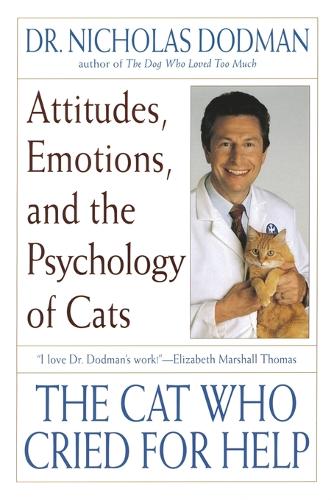
The Cat Who Cried for Help: Attitudes, Emotions, and the Psychology of Cats
(Paperback)
Publishing Details
The Cat Who Cried for Help: Attitudes, Emotions, and the Psychology of Cats
By (Author) Nicholas Dodman
Random House USA Inc
Bantam Books Inc
2nd February 1999
United States
Classifications
General
Non Fiction
636.8089689
Physical Properties
Paperback
256
Width 151mm, Height 228mm, Spine 15mm
286g
Description
Dr Dodman, vet and bestselling author of The Dog Who Loved Too Much, shows how cats can be successfully treated using the latest breakthroughs in feline nutrition, pharmacology and behaviour modification.'
Reviews
"A wonderful and splendid follow-up to The Dog Who Loved Too Much, The Cat Who Cried for Help presents a thoughtful and creative approach to changing detrimental behavior in animals who depend on our goodwill. . . . I love Dr. Dodman's work!"
--Elizabeth Marshall Thomas, author of The Tribe of Tiger and The Hidden Life of Dogs
"I applaud Dr. Dodman's approach.His book establishes a new frontier for the veterinary profession and is essential reading for all who live with cats."
--Dr. Michael W. Fox, author of Understanding Your Cat and vice president of The Humane Society of the United States
"The Cat Who Cried for Help is an interesting and timely book."
--Bruce Fogle, D.VM., M.R.C.VS., author of The Cat's Mind and Encyclopedia of the Cat
"There's a new pet savior in town--Dr. Nicholas Dodman brings the same wisdom, warmth, and miracle working to cats that pet lovers cheered in The Dog Who Loved Too Much.Every pet owner who loves their cat should buy this book."
--Michael Capuzzo, author of Wild Things and Mutts: America's Dogs
"The Cat Who Cried for Help is a fine addition to any animal lover's library, but a must for cat lovers."
--Betty White
Author Bio
Nicholas Dodman, B.V.M.S., M.R.C.V.S., professor of behavioral pharmacology at Tufts University School of Veterinary Medicine and director of the Behavior Clinic, is the author of The Dog Who Loved Too Much.He is an internationally known specialist in domestic animal behavioral research, as well as in the veterinary practice of animal psychology.A board-certified member of the Amencan College of Veterinary Behaviorists, he holds four patents for the pharmacological control of behavior problems, in which field he is a well-known expert
